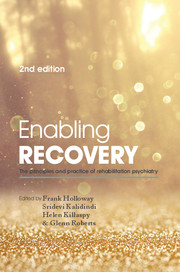Book contents
- Frontmatter
- Contents
- List of contributors
- List of figures, tables and boxes
- Preface
- Part 1 Setting the scene
- Part 2 Treatment approaches
- Part 3 Key elements of a rehabilitation service
- Part 4 Special topics in psychiatric rehabilitation
- 23 Special topics in psychiatric rehabilitation: overview
- 24 Rehabilitation and acquired brain injury
- 25 Autism spectrum disorder
- 26 Risk management in rehabilitation practice
- 27 Rehabilitation: an international perspective
- 28 Psychosocial rehabilitation across culture: the experience in low- and middle-income countries
- 29 Expanding the evidence base
- Part 5 Future directions
- Index
28 - Psychosocial rehabilitation across culture: the experience in low- and middle-income countries
from Part 4 - Special topics in psychiatric rehabilitation
Published online by Cambridge University Press: 02 January 2018
- Frontmatter
- Contents
- List of contributors
- List of figures, tables and boxes
- Preface
- Part 1 Setting the scene
- Part 2 Treatment approaches
- Part 3 Key elements of a rehabilitation service
- Part 4 Special topics in psychiatric rehabilitation
- 23 Special topics in psychiatric rehabilitation: overview
- 24 Rehabilitation and acquired brain injury
- 25 Autism spectrum disorder
- 26 Risk management in rehabilitation practice
- 27 Rehabilitation: an international perspective
- 28 Psychosocial rehabilitation across culture: the experience in low- and middle-income countries
- 29 Expanding the evidence base
- Part 5 Future directions
- Index
Summary
Introduction
Access to and delivery of mental healthcare in the professional sector has major problems in low- and middle-income countries (LMICs). There are a number of reasons for this, and a lack of human and financial resources is only one of many problems. Specialist services are often not available or are difficult to set up, which may be related to a shortage of specialists and the stigma surrounding mental ill-health. Psychosocial rehabilitation (PSR), which is resource-intensive, often does not feature high on the healthcare agenda. Other factors may include a lack of understanding of the role that rehabilitation plays in recovery and integration within the larger society. An understanding of serious mental illness and its ramifications may also affect the establishment of services. In many LMICs clear mental health policies may not be available, and this makes accessing resources more difficult. Consequently, patients and their families may be discouraged from seeking help and clinicians may find it difficult to engage with people who are severely mentally ill. Patients and their families may focus on expectations of cure rather than living with disability. These expectations may discourage some individuals and their carers from seeking rehabilitation and from providing the required long-term engagement. Mental health and mental illness are strongly underpinned by biological substrate but also by cultural and social factors. Psychosocial rehabilitation has widespread psychological, social, cultural, behavioural, spiritual and even physical health ramifications.
Cultures are common shared heritages and belief systems which give meaning to an individual. Cultural values inevitably influence an individual's world view and also cognitions. Cultures also mould an individual's inner world, thereby influencing responses to the external world. Hence it is essential for clinicians to understand individual patients’ idioms of distress, explanatory models and world view if they are to be engaged successfully in any therapeutic endeavour. Beliefs about sickness, behaviours exhibited by those who are sick and the expectations of their treatment, and the responses to such individuals by families and societies are all aspects of the social reality within which we all live.
- Type
- Chapter
- Information
- Enabling Recovery , pp. 425 - 435Publisher: Royal College of PsychiatristsPrint publication year: 2015

